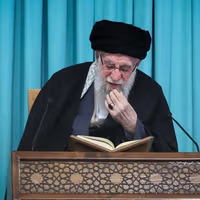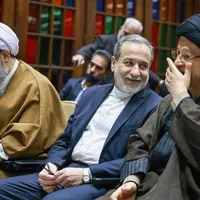Iran prosecutes Instagram users over likes, legal group says

Iranian authorities have opened judicial cases in recent weeks against Instagram users for liking posts critical of the Islamic Republic, pro bono legal group Dadban said on Wednesday.

Iranian authorities have opened judicial cases in recent weeks against Instagram users for liking posts critical of the Islamic Republic, pro bono legal group Dadban said on Wednesday.
Several citizens have been charged with offenses including “insulting the leader of the Islamic Republic” and “propaganda against the state” for liking posts shared by opposition figures or independent media outlets on Instagram, the group said.
Most cases have been filed in smaller towns, though some have also been reported in the northeastern city of Mashhad.
While no verdicts have been issued yet, prosecutors have in some instances set heavy bail amounts for the defendants, according to Dadban.
Iran continues to enforce tight control over digital communication despite easing some bans late in 2024. Major platforms such as Facebook, X, Telegram and YouTube remain blocked or heavily filtered. Access to Instagram and WhatsApp has been periodically restricted, especially during protests.
Tehran also deploys throttling, or selective blocking of app features, and strict regulation of VPNs used to bypass censorship.
In December 2024, Iranian authorities lifted a ban on WhatsApp and Google Play, a move seen as a limited concession to broader social media use.
Still, officials concurrently advanced legislation to regulate cyberspace more tightly and promote domestic replacements for foreign apps.
Critics warn that these constraints further limit free expression and undermine online commerce, especially for small businesses relying on social platforms.
Iran's President Pezeshkian submitted an urgent bill to parliament in July that would impose harsher penalties on social media users and content creators who publish what authorities describe as false or misleading information.
Later the same month, the government withdrew the internet bill amid mounting public pressure and accusations that it sought to criminalize dissent under the guise of combating false information.
Over 2,000 people were arrested during and after the 12-day war with Israel accused of spreading false information online.







The reported detention of two Iranian green card holders marks “a profound erosion of due process,” international human rights lawyer Gissou Nia told Iran International, saying it represents a growing threat to lawful residents.
“Lawful permanent residence was always considered secure — almost unassailable,” Nia said. “To see people who have lived and worked here for years suddenly detained or deported with little to no process is alarming. ICE appears to be acting unlawfully in many of these cases, without proper judicial oversight."
US media reported this week that two Iranian green card holders were arrested in recent months by US Immigration and Customs Enforcement (ICE) in cases apparently involving minor crimes.
The administration of US President Donald Trump has stepped up efforts to detain and deport some green card holders citing past crimes or political activity at odds with its values. Most of the cases are being contested in courts.
Under US immigration law, green-card holders can only be deported in limited circumstances, such as when they commit certain crimes, falsify immigration documents, or remain outside the country for extended periods.
Nia said what is happening now goes far exceeds those bounds.
“Deporting Iranians who fled repression — or sending them to third countries like Sudan, Rwanda or Somalia — violates both international law and America’s own treaty obligations,” she said.
“This normalization of lawlessness should concern every American.”
In Los Angeles, NBC News reported that Sharareh Moghaddam, a small-business owner who had already passed her citizenship exam, was detained after attending what she thought was a routine immigration appointment. Her husband, Hooshang Aghdassi, said she had entered the country legally and had no record of wrongdoing.
“She had green card and passed exam for citizenship and was waiting for the ceremony,” Aghdassi told NBC. “She is not a bank robber or thief or criminal.”
ICE rejected that account, telling NBC Los Angeles in a written statement that reports claiming Moghaddam had no criminal history were “completely FALSE.” The agency described her as “an Iranian native and citizen with a documented criminal history dating back to 2015,” citing two theft convictions between 2015 and 2019, and concluded that she was “subject to removal under US immigration law.”
Newseek reported last month Reza Zavvar, a 52-year-old green card holder in Maryland who has lived in the United States for four decades, was detained for seventy-seven days by ICE in a case related to a marijuana charge in the nineties.
Zavvar, who first came to the country as a child, described his treatment as “unnecessary, inhumane, corrupt.”
“Saying that you can stay here as long as you don’t get in trouble, that you stay clean and just stay here, work, pay taxes — and that’s what I was doing,” Zavvar told the news outlet.
Iranians sent back from US without consent, lawyer says
More recently, 120 Iranians — including political dissidents and Christian converts — were deported to Tehran.
This comes after The New York Times reported that the operation followed “months of negotiations” between Washington and Iranian officials, and that the deportees were flown aboard US-chartered aircraft that left from a military airport in Louisiana, stopped in Puerto Rico to collect more passengers, and continued to Doha before their transfer to Iran.
Immigration attorney Ali Herischi, of Herischi & Associates in Maryland, told Iran International that two of his clients were among those deported against their will. “Their belongings — including their files, evidence and cell phones — have been handed to Iranian authorities. That’s very dangerous,” Herischi said.
He added that some detainees were given a stark choice: “ICE would say, ‘either you consent to deportation to Iran, or we send you to Somalia or Sudan.’ It was, ‘pick your poison.’ In the case of my clients, they didn’t even get that. They just said, ‘you’re done, let’s go.’”
Another Iranian national, Erfan Qaneifard, a political activist and writer, has been held for six months at the Prairieland Detention Center in Texas.
His lawyer, Masoud Peyma, told Iran International that ICE contacted Iran’s Interests Section in Washington seeking travel papers to deport him. “The risk is real. If he is sent back, his life will be in danger,” Peyma said. “There is no reason for him to remain in detention after six months.”
For Nia, these cases expose a broader collapse of process and accountability within the immigration system.
“It’s the normalization of a lack of process — the idea that even a green card, or eventually citizenship, could become conditional on political speech,” she said. “That’s authoritarianism creeping into the system.”
Civil-rights groups echoed those concerns, warning that forced returns could endanger vulnerable Iranians.
“Asylum seekers now face the possibility of being returned to a country where they have a well-founded fear of persecution,” the Iranian American Legal Defense Fund, Pars Equality Center, and the Public Affairs Alliance of Iranian Americans said in a joint statement.
“This runs against core American values as a nation based on hope, freedom, and liberty that has long welcomed people facing oppression who, in turn, have contributed mightily to America," the statement read.
ICE and the Department of Homeland Security did not immediately respond to Iran International requests for comment on these cases.
An Iranian appeals court has upheld prison sentences and social restrictions for six Baha’i citizens in Alborz province on alleged charges of spreading propaganda against the state, Iran International has learned.
The court sentenced the six — Nasser Rajab, Mahindokht Sa’adatmand Menashadi, Naghmeh Mirza Agha, Samar Masoudi, Mahshid Safidi Miyandoab, and Mona Zakaei — to five months in prison, a two-year travel ban, and a ban on social activities.
They were previously handed 10-month prison terms and the same restrictions by a lower court.
In seperate case, an Iranian court sentenced Keyvan Dehghani, a Baha’i citizen from the central city of Isfahan, to six years in prison, two years of exile, and a fine of 1.2 billion rials (about $1,040), according to information received by Iran International.
Authorities also confiscated mobile phones, laptops, and cash, and destroyed the family’s photo albums and personal photographs during a raid on his home.

Baha'is constitute the largest religious minority in Iran and have faced systematic harassment and persecution since the Islamic Revolution of 1979.
The Islamic Republic does not recognize the Baha’i faith as an official religion, unlike Christianity, Judaism or Zoroastrianism.
The Iranian Baha’i community has faced nearly 1,500 years in prison sentences over the past five years, according to a report by HRANA in August this year.
Afghans deported from Iran amid a continuing crackdown on undocumented migrants said authorities there tortured them but deprivation back home was so extreme they are determined to return, Sky News reported on Wednesday.
Expulsions soared after a 12-day war with Israel in June in which Afghans were accused by officials of being potential fifth-columnists collaborating with Iran's foeas Tehran sought to boost populist bona fides after the bruising conflict.
Struggling with deepening economic malaise, Iran has been accused by rights groups of unfairly targeting the Afghan community as it faces dire poverty and repression by Taliban authorities back home.
More than 1.3 million Afghans have been expelled this year, many arriving exhausted and traumatized at the Islam Qala border crossing before being transferred to Herat, according to the report.
Deportees, including young men with scars on their bodies and faces, described violent arrests and beatings by Iranian police.
Rohullah Mohammadi said he was robbed and beaten, suffering an ear injury. “Is this how Islam is supposed to be practiced?” he asked.
Sky News said claims of mistreatment were submitted to Iranian authorities for comment, but no response was received.
Women and girls expressed despair over returning to Afghanistan, citing Taliban restrictions on education and employment.
One woman cried about unpaid work in Iran, while unaccompanied minors such as 15-year-old Tahir described over two weeks of abuse, being forced to sleep on concrete floors and kicked for protesting.
Despite the hardship, poverty forces many to consider returning. Tahir, reunited with his family after two years, said, “I love my homeland, but if there is no work here, how can I survive? I must work.”
His mother said life in Afghanistan is too difficult, while another young man supporting six family members said there are no local job opportunities.
Attempts by Afghan citizens to cross illegally into Iran have doubled over the past six months compared with the same period last year, a senior Iranian border commander said on Tuesday.
Iran set a September deadline for undocumented Afghans to leave, with reports indicating that even some legal residents were expelled.
Human rights groups warn that Afghanistan, already under strain from Taliban rule and Pakistani deportations, is nearing a breaking point.
Australia’s planned designation of Iran’s Revolutionary Guards as as a terror group will be “targeted and appropriate," a spokesperson at the Attorney-General's Department told Iran International, meaning conscripts may be spared any punishments.
Prime Minister Anthony Albanese announced in August that the government would legislate to list the Islamic Revolutionary Guard Corps as a terrorist organization.
The IRGC has long been sanctioned by the United States, citing its support for armed groups like Hamas and Hezbollah across the Middle East and repression at home.
The legislation to enable the listing was introduced to parliament on Wednesday by Attorney-General Michelle Rowland.
The move follows similar steps by the United States, which listed the IRGC in 2019, and Canada, which designated the force in 2023.
Following these listings, many ordinary Iranians who were not members of the force but were conscripted into the IRGC faced obstacles with visa applications, including tourist and student renewals, and residency permits, leading rights groups and the Iranian diaspora community in Australia to wonder about the new move's scope.
Iran International reached out to Australian authorities to ask whether the legislation would distinguish between IRGC members and conscripts and how it might affect visa or immigration applications.
"The Australian Government is committed to ensuring our new legislation to amend the Criminal Code to allow the listing of state entities as terrorist organizations is targeted and appropriate," the spokesperson at the Attorney-General’s Department told Iran International.
Australia’s Home Affairs Department, which is responsible for immigration and border security, said all non-citizens must meet character requirements under section 501 of the Migration Act.
“The Department of Home Affairs works with law enforcement and intelligence partners to cancel or refuse visas of non-citizens who are a risk to Australia’s national security,” a spokesperson said. “All visa applications are assessed on a case by case basis and all criteria must be satisfied before a visa can be granted.”
'Character test'
A person can fail the character test for several reasons, the spokesperson added, including “where a non-citizen has a substantial criminal record, is suspected of associating with, or being a member of, a group involved in criminal conduct, or where the individual may have been assessed as a risk to Australia’s national security.”
“The new framework within the Criminal Code will target state sponsors of terrorism by criminalizing certain interactions with or by the listed entity, criminalizing support for the listed entity, and hardening the Australian environment against the activities of listed entities,” the spokesperson added.
Senator Claire Chandler, who has long advocated tougher measures against the IRGC, asked about the legislation's impact on conscripts, said the opposition would back the government’s plan but scrutinize it to avoid unintended consequences.
“We will be supporting the change and will examine the legislation closely to make sure it is focused on genuine security risks and does not result in unintended harm to individuals caught up in the designation,” the Tasmania lawmaker from the opposition Liberal Party told Iran International.
Iranian activists in Canada who had advocated for designating the IRGC said they were assured by Canada's government the listing would avoid harming former conscripts, however, many soon faced immigration issues after being branded IRGC members.
An 18-year-old French national acquitted by an Iranian court of charges he had spied for Israel has been freed, its foreign minister said on Wednesday, adding that efforts continue to secure the release other detainees.
Jean-Noël Barrot gave no further details about the circumstances of Lennart Monterlos's release but called for of two other citizens held by Tehran on espionage charges to be freed as well.
On Monday, an Iranian court had acquitted dual German-French national Monterlos of espionage charges related to the recent 12-day conflict between Israel and Iran.
He had been arrested in Iran in June around the time of a surprise Israeli air campaign that exposed intelligence failures and killed hundreds of military personnel and civilians.
A statement from the French Foreign Ministry said Monterlos has been reunited with his family.
"I do not forget Cécile Kohler and Jacques Paris, whose immediate release we demand," he added in a post on X.
Iran detained the pair 2022 and subsequently aired what appeared to be a forced confession in which they admitted to spying for Israel on state television.
Iranian Foreign Minister Abbas Araghchi suggested last month that the two could be exchanged for Mahdieh Esfandiari, an Iranian woman arrested in Lyon in February on charges of promoting terrorism through social media.
Last month, a British couple, Craig and Lindsay Foreman, appeared in court in Tehran on similar espionage charges after being held since January.
Western governments and human rights organizations accuse Tehran of detaining foreign nationals to gain political leverage in disputes with Europe and the United States.
Iran rejects the allegation, saying such cases are based on legitimate security concerns.
France withdrew its case against Iran at the International Court of Justice (ICJ) over the detention of Paris and Kohler, the court announced last month without elaborating. It was unclear if the move indicated their release was approaching.